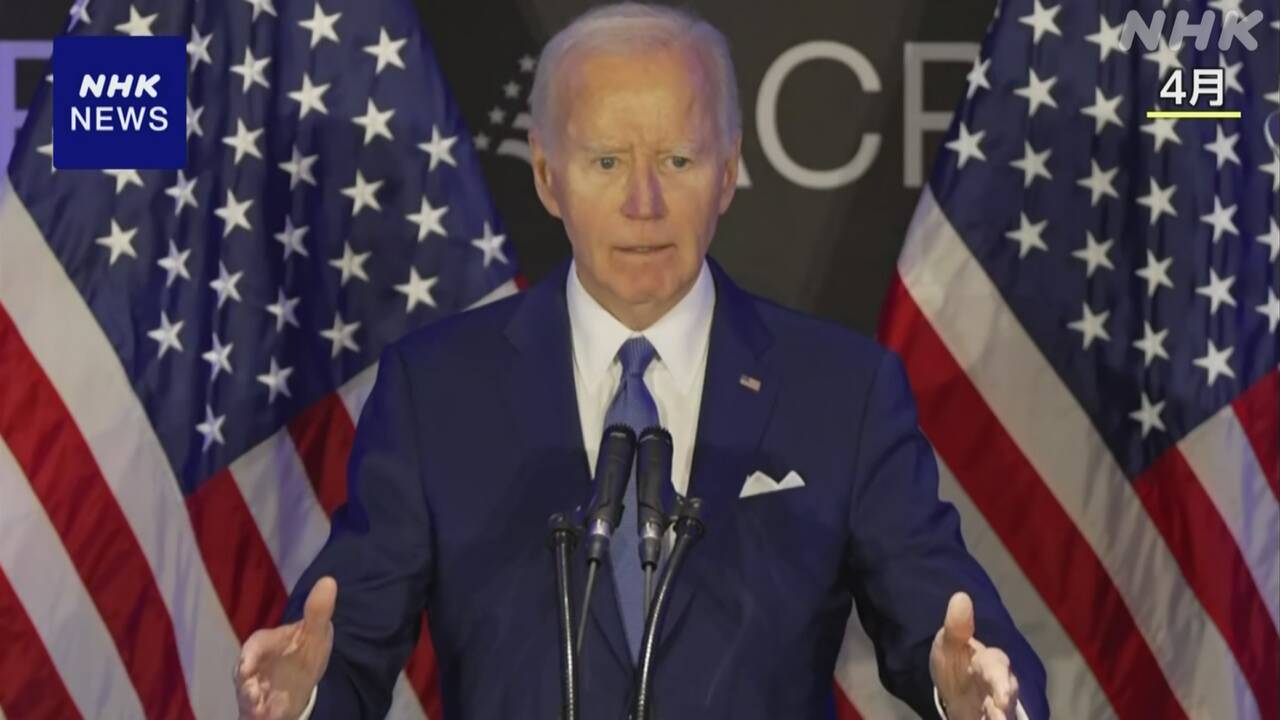Published: 2025-05-08 07:01
バイデン前大統領 “領土問題で譲歩しても ロシアの侵攻続く”

アメリカのバイデン前大統領が、イギリスの公共放送BBCのインタビューに応じ、トランプ大統領がウクライナに対して、領土問題でロシアに譲歩するよう迫っていることについて、「それでプーチン氏がやめると考えるのは愚かだ」と述べ、仮に領土問題で譲歩してもウクライナへの侵攻は続くという考えを示して、批判しました。
BBCは5日、バイデン前大統領が退任後初めてとなるインタビューに応じたとし、その内容を7日、伝えました。
このなかでバイデン氏は、ウクライナでの戦闘の終結を目指し、トランプ大統領がウクライナに対して、領土問題でロシアに譲歩するよう迫っていることについて、「現代の宥和政策だ」と述べて、1930年代にヨーロッパでナチス・ドイツの勢力拡大を招くことになった政策になぞらえ、過ちだという認識を示しました。
そのうえで「プーチン氏は、みずからが率いるロシアの独裁体制の崩壊や旧ソビエトの崩壊を受け入れられない。プーチン氏がやめると考えるのは愚かだ」と述べて、仮に領土問題で譲歩してもウクライナへの侵攻は続くという考えを示して、批判しました。
また、バイデン氏は「私たちこそが、人々を団結させ、世界を導いていく能力を持った唯一の国だ。さもなくば、中国や、かつてのソビエト、ロシアのような国の台頭を招くことになる」と述べて、トランプ大統領の外交姿勢に警鐘を鳴らしました。
| # | 言葉 | 意味 |
|---|---|---|
| 5 | 氏 | うじ (氏) : 1. family name; lineage; birth 2. clan |
| 4 | 領土問題 | りょうどもんだい (領土問題) : territorial dispute; territorial issue |
| 4 | 譲歩 | じょうほ (譲歩) : concession; conciliation; compromise |
| 4 | 述べる | のべる (述べる) : to state; to express; to mention |
| 3 | 示す | しめす (示す) : 1. to (take out and) show; to demonstrate; to tell; to exemplify; to make apparent 2. to point out (finger, clock hand, needle, etc.) |
| 2 | 前大統領 | ぜんだいとうりょう (前大統領) : previous president (immediately preceding the incumbent); former president |
| 2 | 応ずる | おうずる (応ずる) : 1. to answer; to respond; to meet 2. to satisfy; to accept |
| 2 | 対する | たいする (対する) : 1. to face (each other); to be facing 2. to be directed toward (the future, etc.); to be in response to; to be related to |
| 2 | 迫る | せまる (迫る) : 1. to approach; to draw near; to be imminent 2. to press (someone for something); to urge; to compel |
| 2 | 愚か | おろか (愚か) : foolish; stupid |
| 2 | 仮 | け (仮) : lacking substance and existing in name only; something without substance |
| 2 | 侵攻 | しんこう (侵攻) : invasion |
| 2 | 考え | かんがえ (考え) : 1. thinking; thought; view; opinion; concept 2. idea; notion; imagination |
| 2 | 批判 | ひはん (批判) : criticism; judgement; judgment; comment |
| 2 | 招く | まねく (招く) : 1. to invite; to ask 2. to beckon; to wave someone in; to gesture to |
| 2 | 崩壊 | ほうかい (崩壊) : 1. collapse; crumbling; breaking down; caving in 2. (radioactive) decay; disintegration |
| 1 | 公共放送 | こうきょうほうそう (公共放送) : public broadcasting (e.g. NHK, BBC) |
| 1 | 退任 | たいにん (退任) : retirement; resignation; stepping down |
| 1 | 内容 | ないよう (内容) : contents; content; substance; matter; detail; import |
| 1 | 伝える | つたえる (伝える) : to convey; to report; to transmit; to communicate; to tell; to impart; to propagate; to teach; to bequeath |
| 1 | 戦闘 | せんとう (戦闘) : battle; fight; combat |
| 1 | 終結 | しゅうけつ (終結) : end; close |
| 1 | 目指す | めざす (目指す) : 1. to aim at (for, to do, to become); to try for; to have an eye on 2. to go toward; to head for |
| 1 | 現代 | げんだい (現代) : nowadays; modern era; modern times; present-day |
| 1 | 宥和政策 | ゆうわせいさく (宥和政策) : appeasement policy |
| 1 | 勢力拡大 | せいりょくかくだい (勢力拡大) : expansion of one's sphere of influence; increase in one's power (strength, influence) |
| 1 | 政策 | せいさく (政策) : political measures; policy |
| 1 | なぞらえる | なぞらえる (準える) : to pattern after; to liken to; to imitate |
| 1 | 過ち | あやまち (過ち) : fault; error; indiscretion; faux pas |
| 1 | 認識 | にんしき (認識) : recognition; awareness; perception; understanding; knowledge; cognition; cognizance; cognisance |
| 1 | みずから | みずから (自ら) : 1. oneself 2. oneself; for oneself; personally; in person |
| 1 | 率いる | ひきいる (率いる) : to lead; to spearhead (a group); to command (troops) |
| 1 | 独裁体制 | どくさいたいせい (独裁体制) : dictatorial system |
| 1 | 旧 | きゅう (旧) : 1. old; former; ex- 2. the old; old things; old customs |
| 1 | 受け入れる | うけいれる (受け入れる) : to accept; to receive; to agree |
| 1 | 私たち | わたしたち (私たち) : we; us |
| 1 | こそ | こそ : 1. it is ... that ...; precisely; in particular; definitely; for sure; only (when, after, because, etc.) 2. although; while; it is the case that ... but |
| 1 | 人々 | ひとびと (人々) : 1. people; men and women 2. each person; everybody |
| 1 | 団結 | だんけつ (団結) : unity; union; solidarity; combination; teaming up |
| 1 | 導く | みちびく (導く) : 1. to guide; to lead; to show the way; to conduct 2. to derive; to deduce |
| 1 | 能力 | のうりょく (能力) : ability; faculty |
| 1 | 持つ | もつ (持つ) : 1. to hold (in one's hand); to take; to carry 2. to possess; to have; to own |
| 1 | 唯一 | ゆいいつ (唯一) : only; sole; unique |
| 1 | さも | さも (然も) : 1. really (seem, appear, etc.); truly; evidently 2. in that way |
| 1 | 中国 | ちゅうごく (中国) : 1. China 2. Chūgoku region of western Honshu (incl. Okayama, Hiroshima, Shimane, Tottori and Yamaguchi prefectures) |
| 1 | かつて | かつて (嘗て) : 1. once; before; formerly; ever; former; ex- 2. never yet; never before; first time; still not happened |
| 1 | 台頭 | たいとう (台頭) : rise (e.g. of a movement); emergence; rearing one's head; gaining prominence; coming to the fore; gaining power; gathering strength |
| 1 | 外交 | がいこう (外交) : 1. diplomacy 2. selling (e.g. door-to-door); canvassing |
| 1 | 姿勢 | しせい (姿勢) : 1. posture; pose; position; stance; carriage (of the body) 2. attitude; approach; stance |
| 1 | 警鐘 | けいしょう (警鐘) : 1. alarm bell; fire bell 2. warning; wake-up call |
| 1 | 鳴らす | ならす (鳴らす) : 1. to ring; to sound; to chime; to beat; to snort (nose); to snap (fingers); to crack (joints) 2. to be popular; to be esteemed; to be reputed |